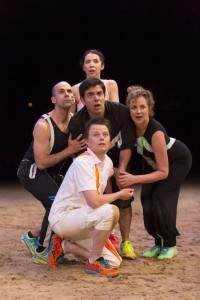 “It is one of the defects of my character that I cannot altogether dislike anyone who makes me laugh.”
“It is one of the defects of my character that I cannot altogether dislike anyone who makes me laugh.”
Somerset Maugham, The Moon and Sixpence
Terry Teachout on the arts in New York City
For years my mother took care of me whenever I needed taking care of, wiping my brow and mending my scrapes, listening to me gripe about the slightest ache or pain (I was no better a patient as a boy than I am as a man). If she ever complained, it wasn’t to me. Now it’s my turn, and you’d think I’d be able to face the moderate rigors of two weeks’ part-time nursing duty with more grace.
If I were a better person, I could at least assure myself that this is a spiritual exercise, a refiner’s fire that will toughen my character and make me more considerate and forgiving upon my return to Manhattan. Would that it were so. I’m sure the sheer relief of shedding my cares will leave me dizzy with joy come Friday, but I’m no less sure I’ll be my old impatient self within a week at most, wondering why the world isn’t capable of ordering itself with a more comprehensive regard to my immediate needs….
Read the whole thing here.
 I have big news. The simplest and best way to break it is to reprint the following press release from Florida’s Palm Beach Dramaworks, which went out this morning. It speaks for itself, and for me.
I have big news. The simplest and best way to break it is to reprint the following press release from Florida’s Palm Beach Dramaworks, which went out this morning. It speaks for itself, and for me.
* * *
Terry Teachout, drama critic for The Wall Street Journal, playwright, librettist, and biographer, will add another title to his impressive list of accomplishments when he makes his directorial debut next season with Palm Beach Dramaworks’ production of his acclaimed first play, Satchmo at the Waldorf. The piece, in which Louis “Satchmo” Armstrong reminisces about his life and career just months before his death, closes out PBD’s 2015-2016 season.
“I invited Terry to direct the play because he seemed like an inspired choice,” says PBD Producing Artistic Director William Hayes. “He obviously knows the piece better than anyone. He’s very familiar with our theatre, as he’s been coming here for years. During that time, I’ve gotten to know him and we’ve had fascinating conversations about theatre, about productions we had both seen and he had reviewed. We were often on the same page, and I was deeply impressed by his acuity. He’s also talked to me about Satchmo at the Waldorf, and I think he’ll bring new insights and a fresh perspective to his play.”
 Says Teachout: “I was surprised and apprehensive when Bill asked me to lunch one day and said that he wanted me to direct the play. I staged a run-through of an incomplete version of Satchmo in a workshop setting in 2011, but that’s the only time I’ve ever directed anything, anywhere. It seemed like a really interesting process, though, and when the New England premiere was mounted in Lenox the following year, I went to every single rehearsal—even the tech rehearsals. I also talked in great detail to Gordon Edelstein, the director, about the process as it was unfolding. I had a feeling that a time might come someday when I’d want to try directing the show myself, and that it’d be smart for me to pay attention. When Bill approached me about staging Satchmo, I knew I’d never get a better chance than this—to work with a company I admire in a theatre I know well. He’s a persuasive guy, and he said, ‘We won’t toss you in at the deep end without a life vest.’ That sealed the deal. By the end of lunch, I’d either talked myself into it or let Bill talk me into it—I’m not sure which!”
Says Teachout: “I was surprised and apprehensive when Bill asked me to lunch one day and said that he wanted me to direct the play. I staged a run-through of an incomplete version of Satchmo in a workshop setting in 2011, but that’s the only time I’ve ever directed anything, anywhere. It seemed like a really interesting process, though, and when the New England premiere was mounted in Lenox the following year, I went to every single rehearsal—even the tech rehearsals. I also talked in great detail to Gordon Edelstein, the director, about the process as it was unfolding. I had a feeling that a time might come someday when I’d want to try directing the show myself, and that it’d be smart for me to pay attention. When Bill approached me about staging Satchmo, I knew I’d never get a better chance than this—to work with a company I admire in a theatre I know well. He’s a persuasive guy, and he said, ‘We won’t toss you in at the deep end without a life vest.’ That sealed the deal. By the end of lunch, I’d either talked myself into it or let Bill talk me into it—I’m not sure which!”
Teachout, a native of Missouri who was a professional jazz bassist for eight years, has had an uncommonly diverse career. Best known as a drama critic, he has also been a dance and music critic, an editorial writer, and a member of the National Council on the Arts. He has written the libretti for three operas by Paul Moravec and is the author of several books, including The Skeptic: A Life of H.L. Mencken, All in the Dances: A Brief Life of George Balanchine, Pops: A Life of Louis Armstrong, and Duke: A Life of Duke Ellington. Satchmo at the Waldorf was written after the Armstrong biography.
The much-lauded play has already been seen in Orlando, Lenox, New Haven, Philadelphia, New York (off-Broadway), and Los Angeles, and upcoming productions are scheduled for San Francisco, Chicago, and Colorado Springs in addition to PBD.
 “I’ve loved all the productions so far,” says Teachout. “Of course I’ve always had notions of my own about how the play might be done, but I never felt like they were right and everybody else’s ideas were wrong—they were just different. So when I stage Satchmo, I’m not going to act like I’m the author and this is my big chance to finally get it all right. I don’t feel that way. Instead, I want to approach the play strictly as a director, a guy who comes in, sits down, and says, ‘O.K., here we all are. Here’s this script. Now, what can we do together to make it work?’ I do have some preliminary production ideas based on my knowledge of PBD’s auditorium and the designers we’ve picked, but they’re completely up for grabs. I’m going to start from scratch—working on this play, in this theatre, with these people. It’s the opportunity of a lifetime, and I’m grateful beyond words for it.”
“I’ve loved all the productions so far,” says Teachout. “Of course I’ve always had notions of my own about how the play might be done, but I never felt like they were right and everybody else’s ideas were wrong—they were just different. So when I stage Satchmo, I’m not going to act like I’m the author and this is my big chance to finally get it all right. I don’t feel that way. Instead, I want to approach the play strictly as a director, a guy who comes in, sits down, and says, ‘O.K., here we all are. Here’s this script. Now, what can we do together to make it work?’ I do have some preliminary production ideas based on my knowledge of PBD’s auditorium and the designers we’ve picked, but they’re completely up for grabs. I’m going to start from scratch—working on this play, in this theatre, with these people. It’s the opportunity of a lifetime, and I’m grateful beyond words for it.”
* * *
For more information on Palm Beach Dramaworks’ production of Satchmo at the Waldorf, which runs May 11-June 12, 2016, go here.
 “Glamour is a trap if you go just for that. It does not develop the ability. At first when one starts acting one is really searching for an identity. Work is really the sole means of an education. I don’t mean by that either you or I were not educated properly when we were at school. But perhaps the real knowledge that we have came afterwards, through our work.
“Glamour is a trap if you go just for that. It does not develop the ability. At first when one starts acting one is really searching for an identity. Work is really the sole means of an education. I don’t mean by that either you or I were not educated properly when we were at school. But perhaps the real knowledge that we have came afterwards, through our work.
“When that realisation comes to an actor he has reached the crossroads. Either he becomes an actor of ego, or a worker.”
Paul Scoield (quoted in Garry O’Connor, Paul Scofield: An Actor for All Seasons)
 Time: Wednesday. Place: a rental car en route from Storrs, Connecticut, to Mountainville, New York. Scott Joplin on Guitar is playing on the stereo.
Time: Wednesday. Place: a rental car en route from Storrs, Connecticut, to Mountainville, New York. Scott Joplin on Guitar is playing on the stereo.
HE Hey, what’s the name of that rag? Look on the back of the jewel box, will you?
SHE “Pine Apple Rag.” (Very dryly) I thought you never got titles wrong.
HE (oblivious) Sometimes I get Scott Joplin’s titles wrong. I mean, they don’t mean anything, right? They’re just arbitrary. You know, like the names of Alan Ayckbourn’s plays. I can’t keep them straight, either.
A pause.
(With embarrassment) That’s the Terryest thing I’ve ever said, isn’t it?
SHE I doubt it. It might be the Terryest thing you’ve said in the last fifteen minutes, though.
In today’s Wall Street Journal drama column I review Eric Tucker’s Hudson Valley Shakespeare Festival production of A Midsummer Night’s Dream and an off-Broadway staging of Doctor Faustus. Here’s an excerpt.
* * *
Eric Tucker and the Hudson Valley Shakespeare Festival were made for each other. I suspected as much when Mr. Tucker, Bedlam Theatre Company’s phenomenally talented artistic director, made his Hudson Valley debut last summer with a “Two Gentlemen of Verona” in which he turned that not-quite-top-tier farce into a riotous spoof of a beach-blanket movie. Now he’s applied Bedlam’s less-is-more style—in this case, five actors, no set or props, dirt-cheap costumes and imagination without limit—to “A Midsummer Night’s Dream,” and the results are sublime.
 Mr. Tucker’s “Midsummer” put me in mind of G.K. Chesterton’s remark that a good production of this miraculous masterpiece produces “an uproarious communion between the public and the play.” That’s exactly what happens under Hudson Valley’s spacious, inviting outdoor tent when Mark Bedard, Sean McNall, Jason O’Connell, Joey Parsons and Nance Williamson take the stage and start to impersonate Shakespeare’s 20-odd characters. But while the laughter that arises from their collective antics is both explosive and irresistible, this “Midsummer” is no mere jokefest. Not since Peter Brook’s now-legendary 1970 Royal Shakespeare Company version has there been so radically original or mysteriously poetic a production of the greatest of all stage comedies. It seals Mr. Tucker’s reputation as the outstanding American classical stage director of his generation.
Mr. Tucker’s “Midsummer” put me in mind of G.K. Chesterton’s remark that a good production of this miraculous masterpiece produces “an uproarious communion between the public and the play.” That’s exactly what happens under Hudson Valley’s spacious, inviting outdoor tent when Mark Bedard, Sean McNall, Jason O’Connell, Joey Parsons and Nance Williamson take the stage and start to impersonate Shakespeare’s 20-odd characters. But while the laughter that arises from their collective antics is both explosive and irresistible, this “Midsummer” is no mere jokefest. Not since Peter Brook’s now-legendary 1970 Royal Shakespeare Company version has there been so radically original or mysteriously poetic a production of the greatest of all stage comedies. It seals Mr. Tucker’s reputation as the outstanding American classical stage director of his generation.
The conceit of the show looks simple on paper: Mr. Tucker has staged “A Midsummer Night’s Dream” as a dream, one from which the five players suddenly awake at night’s end. Accordingly, the action is fragmented in such a way as to suggest the ever-shifting meanings and identities of the characters in a dream, a directorial approach whose surrealism is heightened by the breathtaking quickness with which the actors jump from part to part…
Christopher Marlowe’s “Doctor Faustus” is one of the most famous verse plays ever written, and—in this country, at any rate—one of the least frequently staged. First produced in 1594, it was last seen on Broadway in 1937, when the 20-year-old Orson Welles turned it into a magic show whose climax was the star’s horrific descent into hell. Now Classic Stage Company is doing “Doctor Faustus” off Broadway, this time with a pop-culture idol, Chris Noth, playing the title role. Perhaps fittingly, then, CSC’s “Faustus,” directed by Andrei Belgrader, is an adaptation of the play rather than the thing itself: The script is cut, modernized, yukked up, dumbed down and generally mangled, with results that work on their own greatly diminished terms but will leave anyone who knows the text sputtering with exasperation.
Mr. Noth, best known for playing Mr. Big on “Sex and the City,” gives us a prosy Faustus who might fairly be described as Mr. Little. His performance is very much that of a TV actor, understated to a fault and devoid of expressive depth….
* * *
To read my review of A Midsummer Night’s Dream, go here.
To read my review of Doctor Faustus, go here.
The trailer for A Midsummer Night’s Dream. The narration is by Eric Tucker, the director:
| M | T | W | T | F | S | S |
|---|---|---|---|---|---|---|
| 1 | 2 | 3 | 4 | |||
| 5 | 6 | 7 | 8 | 9 | 10 | 11 |
| 12 | 13 | 14 | 15 | 16 | 17 | 18 |
| 19 | 20 | 21 | 22 | 23 | 24 | 25 |
| 26 | 27 | 28 | 29 | 30 | 31 | |
An ArtsJournal Blog